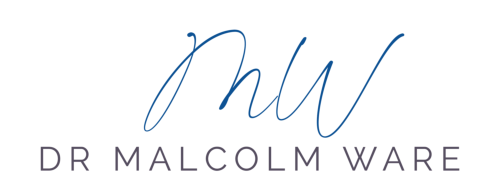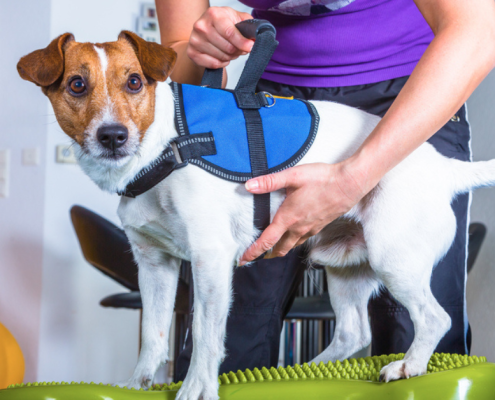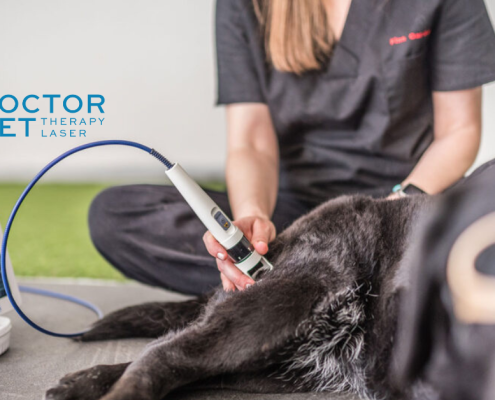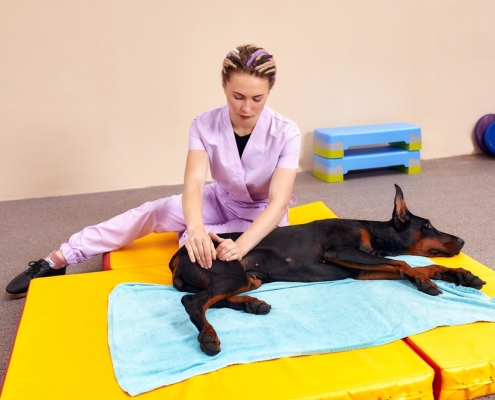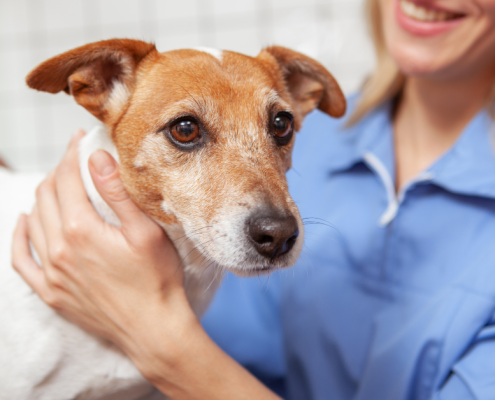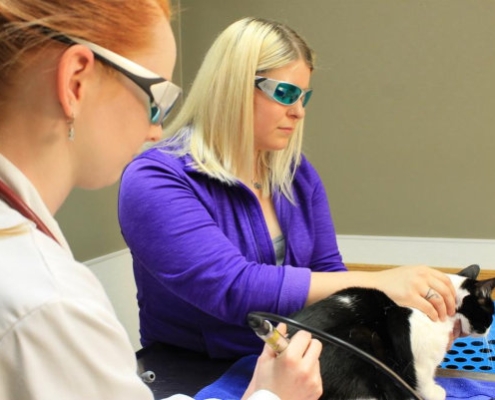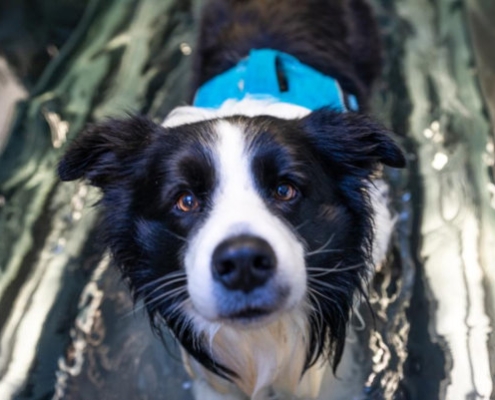Empowering Your Vet Nurses with Laser Therapy
Apart from being an excellent entry modality into the world of Veterinary Rehabilitation, Laser therapy can be performed by anyone on your team trained in its use.
This means it’s a great opportunity for vet Nurses to learn a new skill that can be applied to a whole range of cases to provide wonderful benefits for your patients.
Not to mention – add a new income stream to your practice that clients will absolutely love.
What kind of treatments could our Vet Nurses learn to perform?
While Laser therapy has diverse applications in practice we recommend starting with just a few to allow your team to gain confidence in its use, communicating benefits to clients and incorporating the treatments into your existing protocols.
Our starting out recommendations are:
- Post dental procedure
- Post-op wound healing
- Ear infection treatment and
- Open Wounds
These are short targeted treatments that take less than 5 mins that you build into your existing protocols.
Not only does this give you a point of differentiation and adds value to these procedures, your clients and patients benefit as well.
Gone are the days where vet Nurses were just treated as glorified cleaners and animal handlers. They play an integral role in the functioning of any practice. Most are highly skilled in their field and are expert multitaskers having to juggle a whole host of competing demands throughout their day.
Many are highly driven and seek further career development. Nowadays with the available technology there’s so much more our vet nurses can do.
They’re running our labs, managing our social media,leading teams and becoming far more involved in patient treatments than ever before.
So being able to provide therapies of their own is the logical next step for vet nurses who love learning new things and developing their own areas of expertise.
Laser Therapy – the perfect fit for Vet Nurses
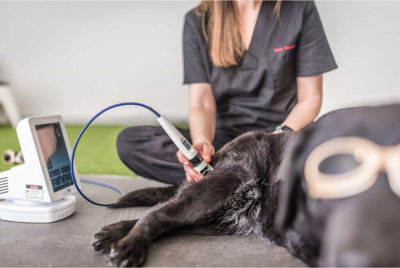 While there is some learning involved in integrating Laser Therapy into your practice, it can be achieved in less time than you think.
While there is some learning involved in integrating Laser Therapy into your practice, it can be achieved in less time than you think.
Modern Class IV Lasers (therapeutic level lasers) come with loads of pre-programmed protocol settings for a whole range of presenting conditions.
This means you don’t have to spend time adjusting settings manually for the different case uses.
The learning involved is more related to technique and patient positioning than actual protocol settings.
No special certification is required and Laser Therapy doesn’t have to be performed by veterinarians making it a great addition to a Veterinary Nurse role.
The Dr Vet Laser that we use and recommend also comes with multiple heads that allow careful targeting of the specific treatment areas such as inside the ear canals and mouth.
Let’s explore the common Single Applications
1: Post Dental Procedure
A single short treatment <3 minutes will help reduce the pain and inflammation that normally follows a dental procedure. In addition it also treats gingivitis that is usually present in these cases.
The treatment is built into your existing dental protocol with little added expense to the client while at the same time adding great value. (A marketable point of difference)
2: Post Op Wound Healing
We used Laser Therapy post op in our surgical cases including all desexings. The quick treatment helped reduce the pain and inflammation around the surgical site therefore providing a more comfortable recovery for our patients.
Again build this into your desexing fees and highlight this point of difference to your clients.
3: Ear infection Treatment (Otitis Externa)
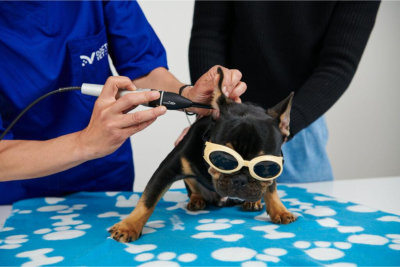 Laser therapy can be useful as it helps to reduce the inflammation and pain caused by otitis. Furthermore, laser therapy presents an antimicrobial effect in some of the microorganisms involved in the pathology, such as Pseudomonas aeruginosa4.
Laser therapy can be useful as it helps to reduce the inflammation and pain caused by otitis. Furthermore, laser therapy presents an antimicrobial effect in some of the microorganisms involved in the pathology, such as Pseudomonas aeruginosa4.
It has also been observed that it helps to accelerate the healing process and reduces scar tissue in cases of tympanic perforation.
A useful application would be after an ear clean in a consultation and before applying any further medications. By doing this you are also removing some of the pain therefore making it easier for the client to apply further ear meds at home.
Again a once off application is all that’s needed.
Can be performed in a consultation room with the client present.
4: Open Wounds (Multiple Applications)
Laser is an effective tool in managing open wounds that you’ve elected not to or can’t stitch for any reason.
It’s also used for cases of wound infections and breakdowns after suturing and perfect for Dog Fight Wounds
This is a good example of a multiple treatment program where treatments are administered at regular intervals over a period of time.
Again the treatments can be done by a nurse along with a vet assessment at every visit and in presence of the client.
There are of course many more applications for Laser therapy in General Practice which relate to more chronic conditions but these are just some great case uses to get started.
We’ll cover more case use applications and scenarios in future blog posts.
Summary of Benefits of Laser Therapy for your practice
- Laser Therapy doesn’t necessarily replace any of your current services but rather it enhances them by either speeding up a healing process
- Laser Therapy treatments can slide easily into a lot of common treatment protocols
- Laser therapy can be performed by anyone in your practice who has undergone the required training
NOTES and References
The Effect of Photobiomodulation Therapy on Inflammation Following Dental Prophylaxis
- Nussbaum et al. Effects of low-level laser therapy (LLLT) of 810 nm upon in vitro growth of bacteria: relevance of irradiance and radiant exposure. J Clin Laser Med Surg (5): 283-290. 2003
- Maleki et al. Effect of local irradiation with 630 and 860 nm low-level lasers on tympanic membrane perforation repair in guinea pigs. J Laryngol Otol, (3): 260-264. 2013
- Crespo R. et al. Photobiomodulaton therapy for wound care: a potent, noninvasive, photoceutical approach. Wound Care J: 157-167, 2019.
- Medrado AP. et al. Influece of laser phtobiomodulation upon connective tissue remodelling during wound healing. J Photochem and Photobiol, 92: 144-152, 2008.
